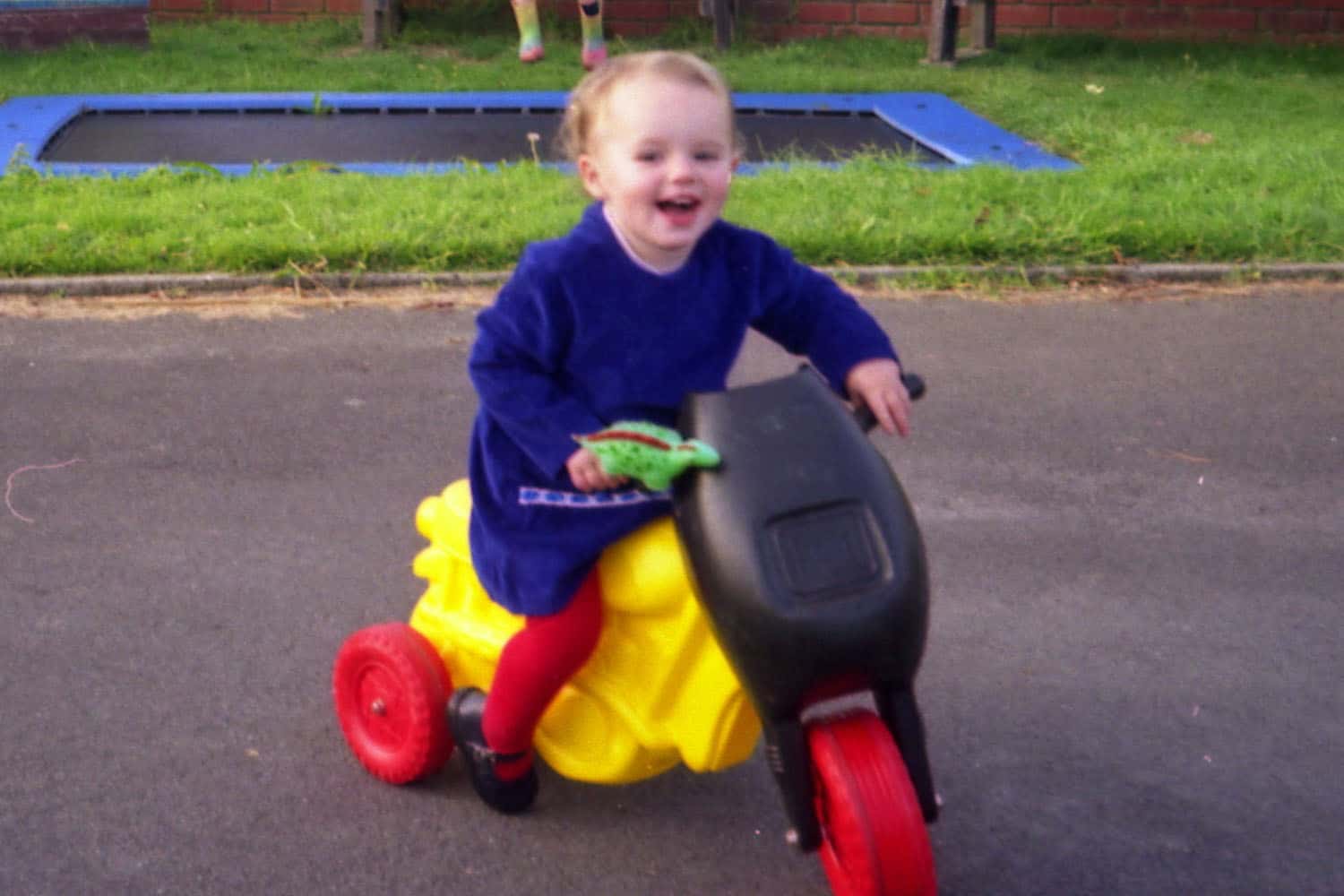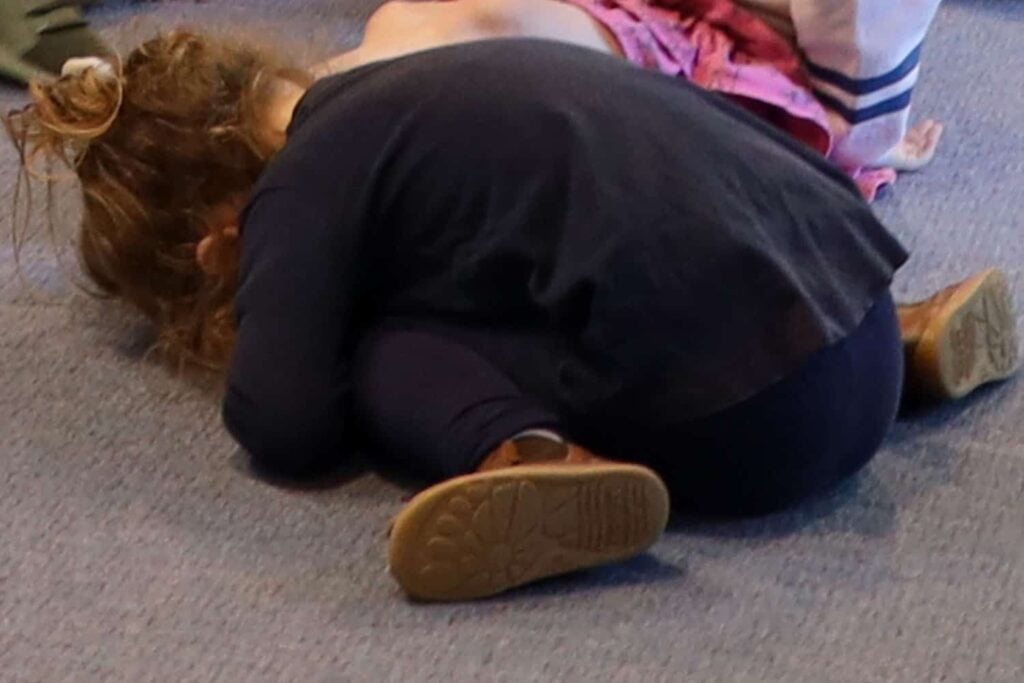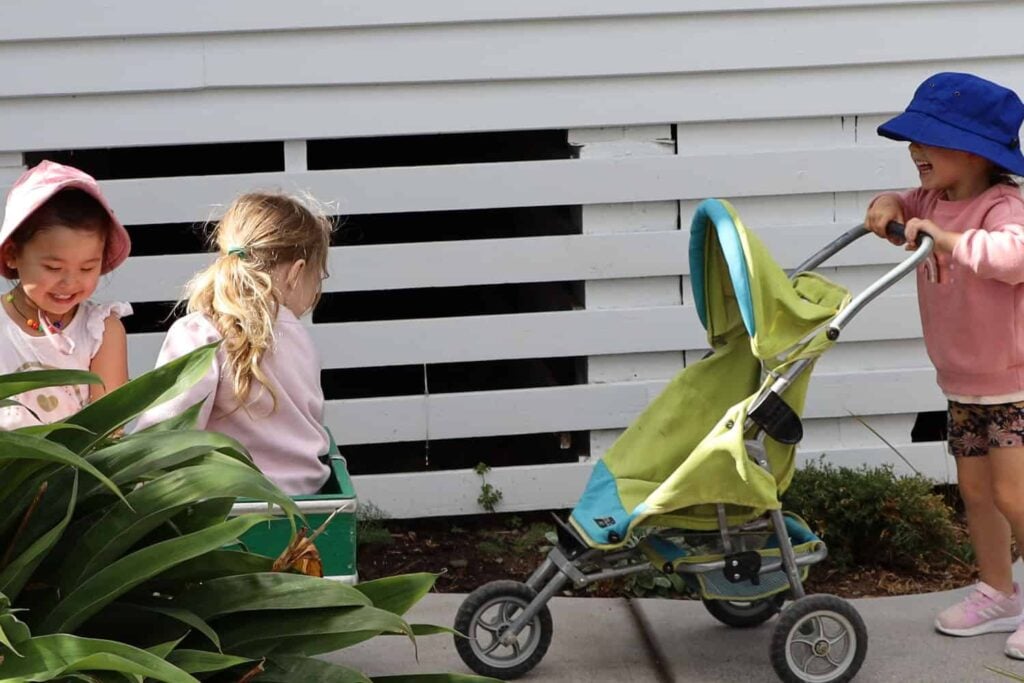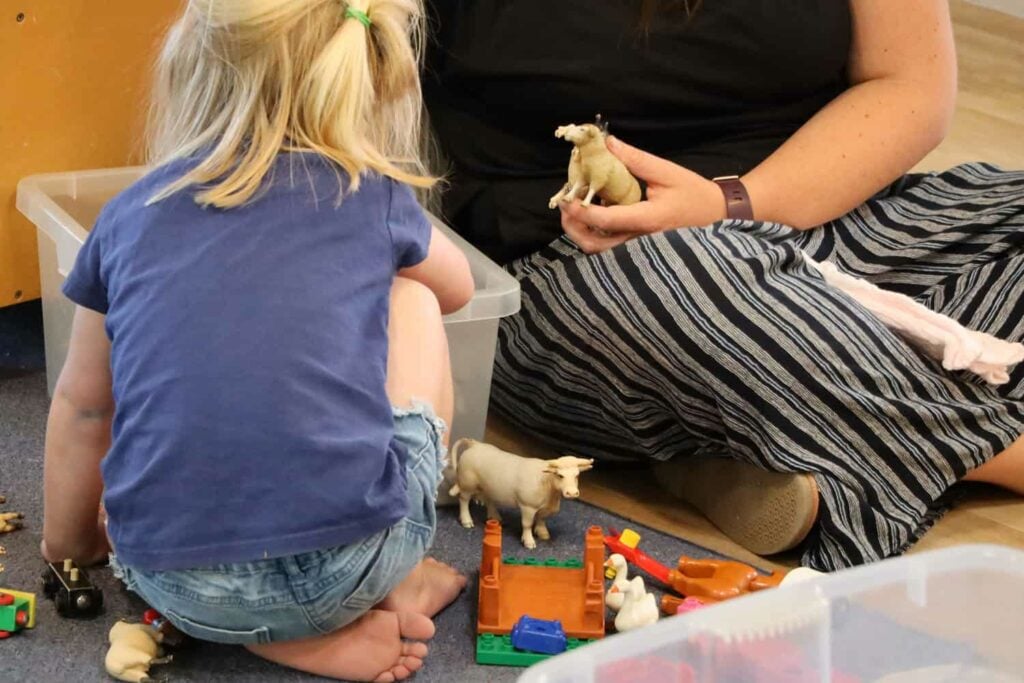A Mother’s View on the Push to Use Early Learning Centres.
By Michelle Rush.
2011, Wellington.
A reality I am seeing that worries me, is a loss of confidence in parenting, and in parents understanding their crucial role as their children’s ‘first teachers’, particularly among the educated middle class parents I spend much of my time with.
I’m going to provide a perspective as a parent on early childhood education and care policy. I’d like to take a broader look at this beyond formal preschool education settings. My focus today, is on the under three’s.
Dr Frances Press talked about “Modernity’s Paradox” and the phenomenon of worsening child outcomes despite increasing economic wealth. To me this underlines why we need to look more broadly at children and their families and indeed society’s needs – beyond the formal education setting.
My views reflect my experience, and the experience I’ve seen among my friends and family as parents of babies and pre-school children. They also reflect what I’ve learned and read about child development.
All of us will be well aware that the years from birth to around age 3 lay the crucial foundations for a child’s later emotional, cognitive and physical health.
All of us will understand the fundamental role of early attachment and bonding with a very few loving, responsive and consistent adults in this 0-3 period, the primary one of which is usually with the nursing mother.
We may also know that recent ground-breaking research into our understanding of brain development is ever more clearly linking early attachment to a child’s long term ability to relate, develop self-control, have empathy toward others, and to be able to function as a healthy and happy adult.
I deliberately use the term ‘healthy’ here, as there is a growing body of evidence in the medical world linking poor attachment and chaotic early experiences to long-term health issues such as heart disease, diabetes, cancer and obesity, as well as mental health issues.
Looking Forward 30 years – what I’d like to see
If I was to look forward, 20-30 years from now, which is when our current generation of babies and toddlers will be in early adulthood, and some will be starting families of their own, this is what I’d like to see:
A cohort of emotionally intelligent and literate productive adults with key indicators showing higher rates of high school completions; a reduction in New Zealand’s ‘long tail’ of poor literacy and numeracy; a downward trend in child abuse and poverty, and a situation where work places have become highly flexible and family friendly in a whole lot of ways. And when I talk about this aspect, I mean in ways we can’t even imagine today. [As an aside, quoting a friend of mine: If an Alien came down to earth and landed here in town in the average workplace, they’d wonder how and whether the species ever reproduced!]
We’d have an ‘outbreak’ of creative, productive enterprise happening, and we’d be harnessing the contributions of children, young people, and older people as part of this. In short, we’d be a much more heterogeneous, age and culture diverse society, with a close sense of cohesion. That’s my dream.
We’ve got the opportunity to achieve this if we adopt a baby and childcentred policy framework to drive education welfare, health, tax and employment policies.
Some current realities regarding early education and care
This brings us to some current realities that I see us facing – some of which I see as directly at odds with creating the type of society I’d love us to have in New Zealand in 20-30 years time. And we’ve touched on some of these already today.
The first reality
Parenting, the role most fundamental to sustaining a stable, intelligent and productive society is grossly undervalued. I’m sure at least some of you here have endured the strange silence that many mothers have at a dinner party, after the ‘what do you do?’ question when you answer “I’m a full time Mum..”
There is an irony here – whilst our decades of feminism have pushed a few women up through the glass ceiling, it’s come at a cost: motherhood has been plunged to even lower depths in the battle for recognition and value.
The ill-conceived and ignorant findings highlighted by the Welfare Working Group’s recommendations to Government recently are a perfect example of just how extreme our undervaluing of parenting has got:
Not only do Paula Rebstock and her cronies not see parenting as legitimate “work” (unless of course you’re talking about a paid nanny or childcare worker) she also thinks it’s OK to force a mother to leave her baby in care from just 14 weeks whilst the mother goes out and does some “real” work.
Contrast this to the thinkers and researchers who operate from a position of child development knowledge: These thinkers liken the mother-child bond as the fundamental basis of a civilised society. This strong initial attachment enables human beings to develop the capacity to love, and the capacity for reciprocal relationships. (References: Goddard Blithe 2008; Gerhardt, 2004; and Odent, 1986).
We ignore this at our peril.
And that brings us to a second, worrying reality
Many parents know very little about child development, and of particular concern, the bonding and attachment process. Here’s a comment made to me by an otherwise very highly educated mother:
“My children need me now they’re at school, because of what I can teach them. When they’re younger, someone else can be looking after them.”
Maia Szalavitz and Dr Bruce Perry talk about this phenomenon as ‘child illiteracy.’ In talking about the situation in the United States of America they note:
“… from the top to the bottom of the economic spectrum, there are huge areas of ‘child illiteracy’ and ignorance about normal development. For many people today, the first baby they may have seen or cared for is their own” (Szalavitz, M. & Perry, B.D., 2010).
In their book, ‘Born to Love – why empathy is essential – and endangered,’ Szalavitz and Perry give a shocking example of a teenage boy raised by well-off, intelligent parents who commits a brutal gang rape of an intellectually disabled girl and shows absolutely no remorse.
In investigating the boy’s background Dr Perry discovers that as a baby the family went through 18 different ‘live in’ nannies before the child was three – each one sacked when the mother got worried the baby was favouring the nanny over her. The mother had no idea of what her baby needed; her own mother was not close by and she’d not been around babies until her own one was born.
Now while this is an extreme example, and we know that other children similarly deprived don’t necessarily go on to become brutal rapists, I think it is the sort of example that should be ringing an alarm bell when we look at the increasing trend to put younger and younger babies and toddlers into non-parental care.
And that’s the third worrying reality in my opinion
Lets look at those New Zealand statistics, quoted in the Children’s Commissioner’s recently released report:
Since 2006, there has been an almost 30% increase in children under the age of 1 enrolling in licensed early childhood services, and a 15% increase in under 2’s.
As at 2010, there were just over 8,700 babies under 1 enrolled, and almost 37,000 under twos. (Carroll-Lind, J. & Angus, J., 2011)
In contrast to Minister Tolley, who is on record as describing this trend as a ‘good thing,’ I find this trend alarming, and what particularly alarms me is that I suspect a vast majority of these parents have no real idea about bonding and attachment, and the very real risks they could be taking with their children.
Whilst the case of the boy who became a rapist is at the extreme end, we should be questioning what this trend of increasing non-parental care means on a continuum – does New Zealand want to see an increase in worrying societal trends already present in places like the United States and the UK where proportionately more babies and toddlers have been in non-parental care than here – with higher rates of teen depression (Biddulph, 2005), divorce, disconnected adults and violence? (Szalavitz & Perry, 2010)
The Children’s Commissioner’s report also sounds some warnings on this trend for earlier and earlier placement in non-parental care:
“What we have found is significant for under 2-year-olds (and in particular for under 1-year-olds) in terms of impact, is duration in care, the numbers of carers and the standard of ECS provided.”
The fourth reality
The fourth reality I am seeing that worries me, is a loss of confidence in parenting, and in parents understanding their crucial role as their children’s ‘first teachers’, particularly among the educated middle class parents I spend much of my time with.
As a parent, I started noticing this becoming more and more apparent at the time that there was a lot of publicity and promotion of the ’20 free hours’ which as you know, was initially available only for teacher-led services. The typical comment justifying daycare I often heard from parents was ‘the teachers know better than me.”
Again this cuts across what research knows to be true: the parent-child relationship remains the most important place for a child’s learning – this from the Commissioner for Children’s recent report:
“One well-supported conclusion, however, is that much of the impact [of non-parental care] is small, in particular when compared with the impact of home circumstances.”
It seems as a society and as individuals that we are forgetting that babies and children need their parents learning how to be parents of them as people. Except in a few extreme circumstances, babies lose out when their parents contract their parenting out. Society, in turn, loses out when there are larger numbers of parenting unsure and lacking in confidence in their parenting role.
A fifth reality
That brings me to a fifth reality that creates a conundrum for the way our society is currently organised: raising babies and children in an isolated nuclear family is not what we are biologically programmed to do. Parents need ongoing day to day support and reassurance and ‘an extra pair of hands’ in the intense and busy activity that is raising a baby and toddler. It does take a village to raise a child. Szalavitz & Perry observe:
“Humans have spent most of the last 150,000 years living in multigenerational multifamily groups… In these the ratio of mature individuals to young children was roughly 4:1 that is, there were four caregiving individuals for every little one. Two parents, many caregivers. That enriched social environment is what our brain expects.
“Compare this with a daycare ratio of one worker to five children: this is one-twentieth of the relationship richness of a ‘natural’ hunter-gatherer setting.”
They go on to ask:
“How does this change our connections to one another? What are the implications for our cultures’ capacity to care although our children are born for love, are we providing what they need to fully unleash that potential?” (Szalavitz, M. & Perry, B.D., 2010.)
In a nutshell, practical support, as well as recognition and valuing of mothering and parenting is a must.
Dr Mary Moloney talked earlier about how children begin their learning journey in the home, and continue it later in early childhood settings and at school.
This brings me to a question for you: how can early childhood professionals such as yourselves support families and children in our currently ‘child illiterate’ society, as they begin this learning journey in the home?
Szalavitz & Perry conclude:
“After birth, mothers need ongoing and consistent relational support in order for them to best create a safe, nurturing environment for their babies… we need to do everything we can to support mothers of young children, from making sure their basic emotional and physical needs are met to just hanging out with them and being available when they need us most.” (Szalavitz, M. & Perry, B.D., 2010.)
Dr Frances Press talked earlier about a recent development in Australia with some early learning centres becoming a focus for family learning, not just children.
I was privileged enough here to benefit from New Zealand’s unique version of this – and something with the benefit of a long history in supporting families and children, which is Playcentre.
As a Playcentre mother, I learned a huge amount from watching and working with other parents, and I know that this went both ways. I also benefited hugely from the formal adult education programme that parents complete, which included child development, how children learn, how adults can extend children’s learning, plus parenting skills like discipline and communication.
For myself, being a Playcentre Mum has made me a better parent. A far better parent. I use the skills I gained in understanding how to extend my children’s learning pretty much every day, well after my years at Playcentre. In myself I feel very well equipped to support them in their learning journey through their schooling and beyond. That brings me to some other questions I’d like us to consider:
- How can existing early learning centres better recognise and safeguard the need for infants and toddlers to be cared for primarily by their parents – and better support parents in this?
- What other parent and family-supporting models for early learning can we develop?
- What else in the way we run our society needs to shift and change to achieve this?
The policy framework
I said earlier it is my view that to achieve a dream of a socially cohesive, creative, productive and healthy society in 20-30 years time, we need to adopt a baby and child-centred policy framework to drive education welfare, health, tax and employment policies.
Lets have a look at what we’ve currently got, and what we might want to reconsider.
In making these comments, I’d like to emphasise that I am not an expert in this policy area; there is a lot about existing policy relating to babies and children I don’t know about, and the comments I make here are made simply in relation to those aspects I have a little knowledge and experience of.
In my view, the current policy framework for early childhood education and child-rearing is a mixed bag – we are doing some things well, and some things poorly, and there are some recent policy decisions and trends that I believe pose very real risks to children, parenting and society in the long term.
What are some of the good things about our current policies?
- Our maternity leave provisions are a good start.
- Te Whaariki (New Zealand’s world leading holistic early childhood education curriculum), is a fantastic asset to NZ.
- The tax regime under Working for Families is helpful to many lower and middle income New Zealand families with an ‘at home’ parent or where one parent works part time.
- The ’20 free hours’ policy is a mixed bag. On the good side, some low income families have been able to afford to put their kids in an early childhood service for the first time, with the benefit of gaining social, play and learning experiences they otherwise wouldn’t have got.
What’s not so good about our current policies?
The funding arrangements favour early childhood education providers that provide all day, all week care. This is not the type of early childhood education that ‘adds value’ – in contrast it is the type that carries risks with it. (Biddulph, 2007)
Families only wanting part time care are often forced to pay for all week care or miss out. Flexibility is hard to come by. Capital funding decisions provided by Government in recent years have tended to favour larger all-day providers as well. These arrangements penalise sessional providers, which tend to be community crèches, kindergartens, Playcentres and such like – and yet these forms of early childhood education are often better at meeting children’s needs of early childhood education experience which can be summed up as being of greatest benefit when it is little and often. (Mitchell, L 2008).
In my locality, for example, despite great local support for the kindergarten, it’s now gone to an all day session, increasing waiting lists considerably to the point where children have to be almost 4 and three quarters before they can get in. As you can imagine, this has not pleased either the teachers or the local parents.
We need to be questioning whether hourly rates paid for bums on seats is the most appropriate way to fund early childhood education. There is a cost to a Centre just to open the door.
Adult education funding has been cut, taking with it resourcing for some parenting programmes. In Playcentre’s case, they are having to find alternative resourcing to cover their introductory Level 1 parent education programme. What is that saying about a commitment to supporting, involving and engaging parents in their children’s early learning?
The recent decision discussed by Minister Tolley this morning, to enable licensing of early childhood services for up to 75 under two’s and up to 150 under 5’s (if I’ve understood it correctly) is another step in the wrong direction for reasons we’ve heard a lot about already today from the guest speakers.
I’ll return now to the ’20 free hours’ policy and look at its downsides. Well it’s misdirected for a start – there’s been a huge increase in the hours children are spending in early childhood education, but in the words of the Minister herself, it hasn’t increased participation among the groups it was theoretically targeted at – notably Pacifica and Maori and children in poverty. And it’s costing New Zealand far too much. (Tolley, 2010)
I talked earlier about the erroneous perceptions I’d seen the policy creating among mainstream New Zealand families, aided and abetted by the Ministry of Education’s publicity machine. Here’s something a friend said to me which I think sums this up perfectly, when she was (reluctantly, I might add), trying to work out where to place her young child:
“Well, I mean, the government provides 20 hours free, so I suppose that means he (her child) needs [all of] it.”
There’s been a lot of discussion and concern today about how undervalued ECE teaching is, with a lot of discussion on the matter of regulations regarding qualified teachers, drawing on the policy issues with this being experienced in both New Zealand and Ireland.
I’m really concerned at how undervalued parenting is. It seems to me there’s a connection between these two concerns, and with that, an opportunity for us to work together on this. It’s my hunch that if we advocate for greater support, value and recognition of parenting, and the core role of parents as children’s ‘first teachers,’ that we’ll also bring attention to the importance of early childhood teachers being properly qualified and professionally supported in their important role.
I’d like to suggest the Minister of Education’s taskforce currently reviewing funding of early childhood education look first at the fundamental development needs of babies and children, and what their parents need to help meet these.
We should then revise the funding mechanisms and regulations for early childhood education from the ground up, with the child’s needs centre stage.
We need to be very clear what the funding is doing. This means policies that create incentives for parents to raise their own children, particularly in the critical birth to three year period, and incentives for parents to get, and stay involved in their children’s education in the pre-school years.
I’d revisit funding arrangements and provide funding for Centre costs separate to ‘bums on seats,’ enabling sessional providers and parent-led providers to be on a level playing field with all day providers.
I’d toughen the regulations for centres providing for under threes – for a start this would be a minimum regulatory ratio of 1:3 where parents are not there; a limit on group size in line with what the Commissioner for Children is recommending; six monthly ERO checks and limits on the hours and days a baby can be in group care without its parent present; and 100% qualified teachers with ongoing professional development provision for them.
I’d maintain more flexible regulations for sessional services providing ECE for up to a maximum of 4 hours a day, particularly those centres operating where parents are present.
And most importantly, I’d like to see a reorienting of community and state initiatives to assist parents without the capacity, capability or support, to be better parents.
If there are worries about affording this, then the first item that should be reduced is the ‘20 free hours.’ If this really is an ‘education’ and ‘participation’ policy, then lets make it ’10 free hours’ for 3 and 4 year olds, recognising, as I discussed earlier that regular, short periods of attendance is what evidence shows provides the best benefits.
The freed up money can then be used for ‘at risk’ families and children who need it most – with wrap around programmes to support and empower their parents to be better parents. Society shouldn’t be taking their parenting role over. Nor should society ever pretend ‘someone else’ can do it. From the child’s perspective, someone else can’t.
We need to look at how and what this assistance to the parents and the family needs to look like, using a ‘whole of Government’ approach, and early childhood education providers need to be a big part of this. This one will cost, but when we recognise how fundamental a stable and loving environment for babies and toddlers is to our very future as a society, it will be an investment very well spent.
If we make steps in this direction, we’ll ensure children, parents and wider society gain the best from early childhood care and education, rather than New Zealand running the risk of its next generation losing from it.
“If we want our children to carry laughter – the gift of life – into adult life, we do not need a Nanny state. We need a state that gives children their parents and, most of all, gives babies their mothers back.” (Goddard Blythe, 2008)
References
Biddulph, Steve, quoted in The Times (UK) May 6 2007, in an interview on risks of putting young children into daycare.
Biddulph, Steve, 2005, Raising Babies.
Bradley R.H. & Lowe Vandell D, 2007, Child Care and the Well-being of Children, Arch Paediatric Adolescent Medicine. 2007;161(7), pp. 669-676.
Carroll-Lind, J. & Angus, J., 2011, Through their Lens – an inquiry into non-parental care and education of infants and toddlers. Office of the Commissioner for Children.
Gerhardt, Sue, 2004, Why love matters, how affection shapes a babies brain
Goddard, Blythe Sally, 2008, What Babies and Children Really Need.
Harriet J.; van I Jzendoorn, Marinus H, 2006, Children’s Elevated Cortisol Levels at Daycare: A Review and Meta-Analysis, Vermeer, Early Childhood Research Quarterly, v21 n3 p390-40
Liedloff, Jean, 1986. The Continuum Concept: in search of happiness lost.
Mitchell, Linda, 2008, Outcomes of early childhood education literature review, report to the Ministry of Education (NZ)
Odent, Michel, 1986, Primal health.
Pikler, Emmi, 1940, Friedliche Babys – zufriedene Mütter. Pädagogische Ratschläge einer Kinderärztin. (Peaceful baby – happy mothers. Pedagogical advice of a pediatrician.)
Szalavitz, Maia and Perry, Bruce. D., 2010, Born for Love: why empathy is essential – and endangered.
Te Whariki, NZ’s early childhood education curriculum. Ministry of Education:
Tolley, Anne, Minister of Education, 6 May, 2009, Keynote address to Australian Schools Education & Early Childhood Congress.
Early researchers, whose findings have influenced NZ Playcentres and current thinking on play as children’s work and learning reflected in these speech notes:
- Piaget, 1952, The Origins of Intelligence in Children
- Montessori, 1946, Education for a New World
- Froebel, 1826, Menschenerziehung (tr. The Education of Man)









